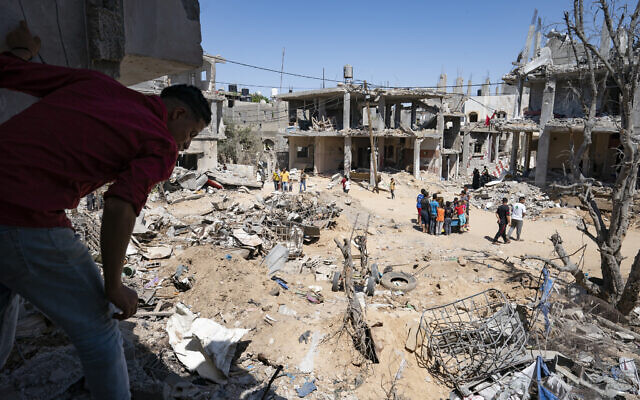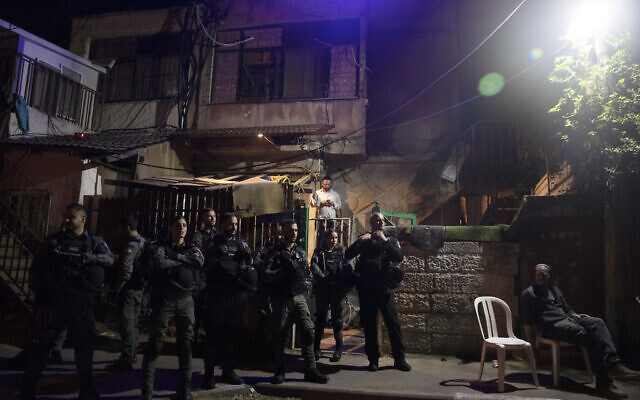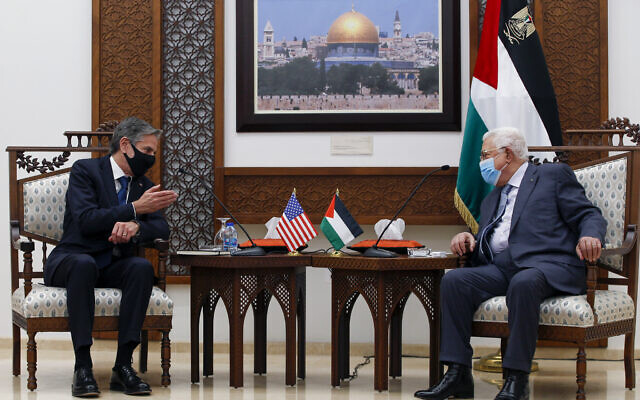Top US diplomat says he passed along concern during visit to region, during which he heard of interest from both sides in maintaining Gaza ceasefire

US Secretary of State Antony Blinken warned Israeli leaders this week that moving forward with a series of evictions of Palestinian families in East Jerusalem could spark renewed “tension, conflict and war.”
Blinken passed along the message in-person during his visit to the region, he told the Axios news site in a phone interview Thursday while flying back to the US.
“We raised the concerns that we have on all sides with actions that in the first instance could spark tension, conflict and war and also ultimately undermine even further the difficult prospects for two states,” the Biden administration’s top diplomat said.
While in Israel on Tuesday and Wednesday, Blinken met with President Reuven Rivlin, Prime Minister Benjamin Netanyahu, Foreign Minister Gabi Ashkenazi, Defense Minister Benny Gantz and Opposition Chairman Yair Lapid. The secretary told Axios that he raised the “evictions of Palestinians from their homes where they lived for decades and generations, the demolitions of housing… and of course everything that took place on and around the Temple Mount,” where Israeli police have clashed with Palestinian worshipers both before and after last Thursday’s ceasefire.

The Supreme Court on Wednesday notified Attorney General Avichai Mandelblit that he had until June 8 to submit a legal opinion regarding the appeals of four Palestinian families — more than 70 people — against their looming evictions from the Sheikh Jarrah neighborhood.
The evictions are based in part on a 1970 Israeli law that allows Jews to reclaim East Jerusalem land owned by Jews before 1948. No similar law exists for Palestinians who lost their homes in what is now Israel during the 1948 war and the Knesset passed a law in 1950 barring them from reclaiming property lost.
According to Ir Amim, a left-wing human rights group focusing on Jerusalem, around 200 families in East Jerusalem are under similar threat, with cases slowly moving through administrative bodies and Israeli courts. Around 70 of those families live in Sheikh Jarrah.
For its part, the Foreign Ministry has accused the PA of “presenting a real estate dispute between private parties, as a nationalistic cause, in order to incite violence in Jerusalem.”
Sheikh Jarrah has long been a focal point of Jewish-Arab tensions. A small Jewish community lived in the area before 1948, when East Jerusalem fell under Jordanian control. Home to a shrine revered as the final resting place of Shimon Hatzadik, a third-century BCE high priest also known as Simeon the Just, the neighborhood is often visited by Jewish pilgrims.

In the weeks leading up to the 11-day Gaza war that ended last Thursday, Sheikh Jarrah became the scene of mass protests, with Palestinian demonstrators clashing with police. Tensions eventually spilled over to the Temple Mount as well, and Hamas road the wave of violence, firing rockets at Jerusalem on May 10 that led to the IDF’s launching of Operation Guardian of the Walls.
The US has raised its opposition to the Sheikh Jarrah demolitions several times in recent weeks but tabled criticism on the matter once the Gaza war broke out, instead getting behind Israel and its right to defend itself against Hamas rocket fire.
Blinken made his first visit to the region as US President Joe Biden’s secretary of state this week, making stops in Jerusalem, Ramallah, Cairo and Amman as he sought to ensure the longevity of the Egyptian-brokered ceasefire.
He told Axios that during meetings with Palestinian Authority President Mahmoud Abbas and Prime Minister Mohammad Shtayyeh he “raised incitement to violence or letting violence go forward with impunity,” as well as the PA’s “very problematic” welfare program, which includes payments to security prisoners who have killed Israelis as well as to the families of assailants killed in terror attacks.

Blinken said he heard from both Israeli leaders directly and Hamas indirectly through Egypt that they wanted the ceasefire to hold. “But it’s also important that we avoid various actions that could unintentionally, or not, spark another round of violence,” he added.
“The ceasefire was not an end in itself, as important as it was, but also a means to have some space to start to build something a little bit more positive,” Blinken said.
He insisted that the Biden administration was interested in fast-tracking the reconstruction of Gaza, but that the UN would have to lead the effort in partnership with the PA.
“What Hamas feeds on is the lack of hope and lack of opportunity. So the best answer is to try and provide that and to make sure that the Palestinian Authority has a role to play in delivering that hope and opportunity, as well as others including Israel. So I think it makes a profound strategic sense — never mind mind the importance on a human level,” Blinken said.
This week, he announced tens of millions of dollars in aid to the Palestinians aimed at jump-starting the rehabilitation process in Gaza. But as much as the Biden administration wants to strengthen the PA, none of its aid can go to Abbas’s government directly due to laws passed by Congress barring such assistance so long as Ramallah doesn’t reform its welfare program. Palestinian officials told The Times of Israel in December that they were working on amending the payment system, but are also hoping that Biden will agree to deem as unconstitutional legislation labeling the Palestinian Liberation Organization a terror group.
While indicating willingness to cooperate with Gaza reconstruction efforts, Israel has demanded progress toward the return of the remains of IDF soldiers killed in Gaza as well as a pair of civilians who are being held captive by Hamas.
“We fully understand the deep need to bring the remains of the soldiers and the Israeli citizens back home. And to the extent that we can help in any way we certainly will. At the same time, I think there are very urgent needs for many people in Gaza that needs to be addressed,” Blinken said on the matter.
Asked about his announcement of US plans to reopen a consulate in Jerusalem for the Palestinians, Blinken clarified that it would not change former president Donald Trump’s decision to recognize the city as Israel’s capital, nor was it a recognition of East Jerusalem as the capital of a future Palestinian state. The secretary said that such final status issues are up for the parties to decide in direct negotiations.
The consulate’s reopening — after it was shuttered by Trump in 2019 — will require approval from Israel and Netanyahu pushed back on the move during his meeting with Blinken. However, the secretary told Axios that it would ultimately be in Israel’s interest.
“I think there is no basis for concern. To the contrary, I think, it is beneficial to everyone. If we’re not engaged with the Palestinians that undercuts our ability to advance things that I think would be everyone’s benefit, including Israel,” Blinken said.
As reported by The Times of Israel
